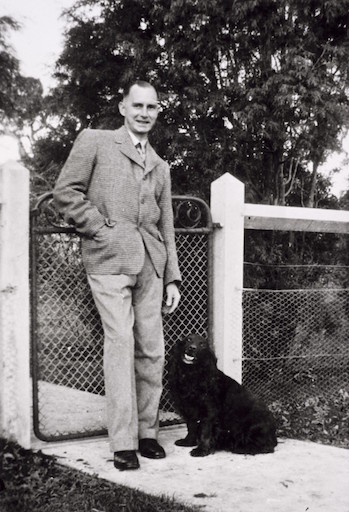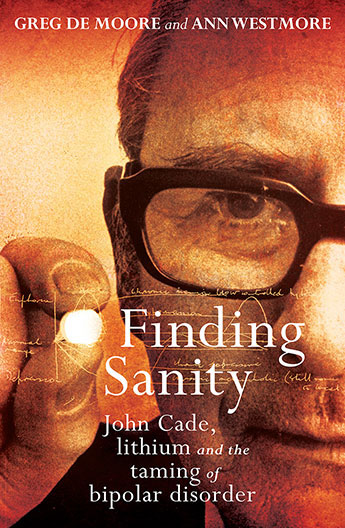John Cade wrote in 1979: “Depressive illness is the most painful illness known to man, equalling or exceeding even the most exquisite physical agony. The patient is inconsolably despairing, often guilt-ridden, having committed, they imagine, unforgiveable sins — completely immersed in the internal world of misery and utter loneliness. There is no pleasure in living, no interest or energy in doing anything except agitatedly bewail or silently brood upon an unhappy fate; no hope for the future abandonned by God and man. Suicide seems the only escape fro mthe misery.” From Mending the MindIt can be said that John Cade “discovered” lithium, in the sense that he actually identified this substance that would become the chemical that would help many in the manic-depressive (bipolar) community.
One of the best biographies I read last year was Finding Sanity by Greg de Moore and Ann Westmore, published by Allen & Unwin in 2016. This is a biography, not a memoir, as it explores the life of Australian Doctor John Cade in detail, starting with that of his parents, and delving into his own family life spent (he, as caretaker and psychiatrist) in asylums in country Victoria during the 1940s. It can be said that John Cade “discovered” lithium, in the sense that he actually identified this substance that would become the chemical to help many in the manic-depressive (bipolar) community.
In the fourth decade of the twentieth century, Cade hit upon a simple treatment for severe manic illness: LITHIUM. This treatment was already used as a cure by ancient Greek doctors before the element had been identified scientifically. Soranus of Ephesus and others ordered salt baths containing high levels of lithium for excitable patients. Today lithium has become the gold standard for treating bipolar disorder and saving and supporting lives. Cade changed the course of medicine and saved millions of unwell mental illness patients from suffering, not to mention saving governments billions of dollars in health costs. Strangely enough, not many doctors or politicians appear to know about him and his story today.
To quote from the first pages of the biography, “Lithium is the penicillin story of mental health … and Australia’s greatest mental health story.”
In 1920, after his father David Cade returned from fighting in Gallipoli and France, he and his young family settled into a doctor’s cottage in the grounds of a Victorian country asylum there. The younger Cade followed his father into a medical career, also choosing to specialise in psychiatry. After he returned from Changi, where he was imprisoned in a hellish camp by the Japanese, he was anxious to catch up on lost time, and threw himself into work. His work was helping the mentally ill and experimenting with new treatments. This was a time when manic depression either went untreated, or cures were attempted through crude, early forms of lobotomies and electric shock treatment. His was the first effective medication to treat a mental illness, and in the form of a cheap and natural mineral salt.

Cade tested his theories by injecting uric acid from his manic patients into guinea pigs. Unfortunately, all of the animals died. To prevent this, he used lithium urate, which was highly soluble, to see if urea was, indeed, the culprit in causing mania. To Cade’s surprise, he found this produced a calming effect in the guinea pigs, instead of increased excitation.
Through a series of very careful experiments on both guinea pigs and, later on, people, it was proven that lithium had a pronounced effect on mania. This wonderful discovery was quickly followed by the finding that lithium also helped with the depressive symptoms of bipolar.
Cade’s remarkably successful results were detailed in his paper, Lithium salts in the treatment of psychotic excitement, published in the Medical Journal of Australia (1949).
The significance of what John Cade achieved is hard to overestimate.


Leave a Reply
You must be logged in to post a comment.